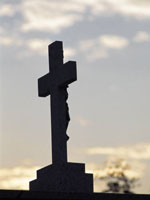Act of indescribable beauty: Crucifixion led to defeat of sin, death – only through death, resurrection of Jesus

A MONTHLY MESSAGE FROM THE ELCA PRESIDING BISHOP
In 2010, I was part of the Northeastern Ohio Synod/Roman Catholic Diocese of Youngstown pilgrimage to Germany and Italy. We visited Martin Luther sites and then traveled to Rome.
It was an interesting experience to be in the places that formed our spiritual identities in the company of those who, in our respective narratives, had the role of the “other,” or even the “enemy,” during and after the Reformation. But we came to a deeper respect and appreciation for each other’s tradition by being pilgrims together.
All of us were asked what the most memorable part of the trip was. For me that moment came after I was home.

The televangelist’s exegesis (explanation) of the passage led him to conclude that Jesus said we must “speak to the mountain”—prayer was not enough. If we wanted a better job we needed to “speak to that mountain” and all the heavenly forces would be set in motion. Poor health? Fear of foreclosure? Troubled marriage? “Speak to that mountain” and get it fixed.
Wow. When my father was dying why didn’t I speak to that mountain? When Paul prayed three times that the thorn in his flesh be taken away, why didn’t he speak to that mountain? Here it was, the “Name It and Claim It Health and Wealth Gospel.” The people in that arena were cheering.
At that point I remembered our stop at the Flossenburg concentration camp in Germany. This is where theologian Dietrich Bonhoeffer was brutally executed just before the end of World War II: Bonhoeffer who spoke against “cheap grace” or what I have come to call “entitlement grace”; Bonhoeffer who in his ministry and death experienced the costly grace of discipleship.
Flossenburg was a forced labor camp. Inmates worked in rock quarries until they died of exhaustion, exposure, starvation or disease. The prison population was 20 percent Jewish. The rest were political prisoners, the mentally ill, addicts, homosexuals, prisoners of war and the Roma people. One Flossenburg survivor who had been transferred from Auschwitz said the slow death of the labor camp was worse.
After liberation the surviving prisoners constructed a stone chapel out of the rubble of the guard towers. In it was a stone triptych behind the altar. On one side panel was carved the image of a prisoner trying to lift an impossibly heavy block of stone while being beaten by a guard. On the other side panel was a carving of a woman bent under the weight of a basket of rubble as a child clung to her. Our guide said the basket of rubble represented the awful burden of the women left behind when the men were taken to the camp.
In the center panel was a carving of Jesus on the cross. Here, literally carved in stone, was the theology of the cross. In the midst of our suffering, because of our suffering, because of the suffering we cause, is the cross of Christ. There was no place for the empty promise of the “Name It and Claim It” gospel. There was only space for the cross, carved by the bruised hands of the suffering.
The speak-to-the-mountain-theology-of-glory is a tempting and seductive message. It packs churches and raises money. It is happy, upbeat, fun—but empty.
When Paul prayed that his affliction be taken away the Lord answered, “My grace is sufficient for you, for my power is made perfect in weakness.” It turns out that the televangelist was partly right. The heavenly forces were set in motion, but it was motion that led to the defeat of sin and death only through Jesus’ death and resurrection. Jesus’ crucifixion was neither pretty nor happy, but it was an act of indescribable beauty that brings true joy.
The Rev. Elizabeth A. Eaton
Presiding Bishop
Evangelical Lutheran Church in America
This column originally appeared in the APRIL 2014 issue of The Lutheran magazine. Reprinted with permission.



